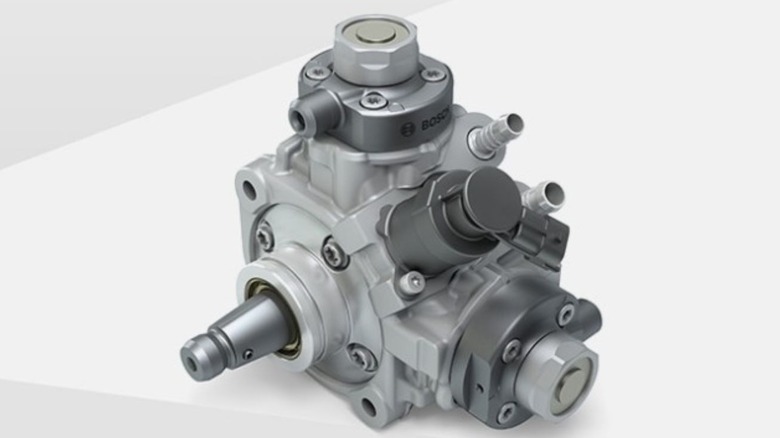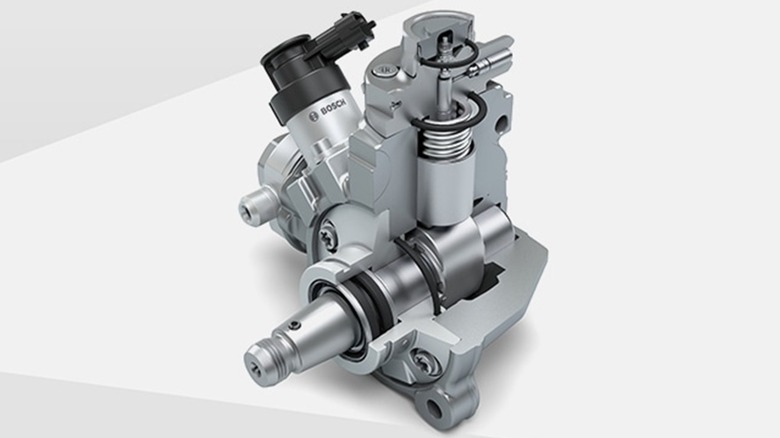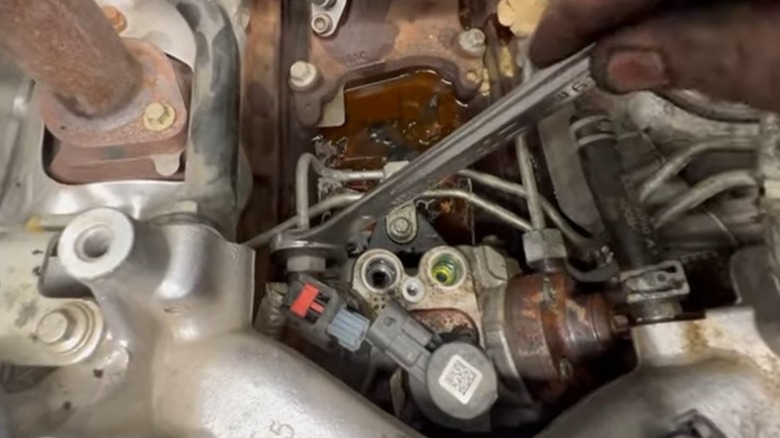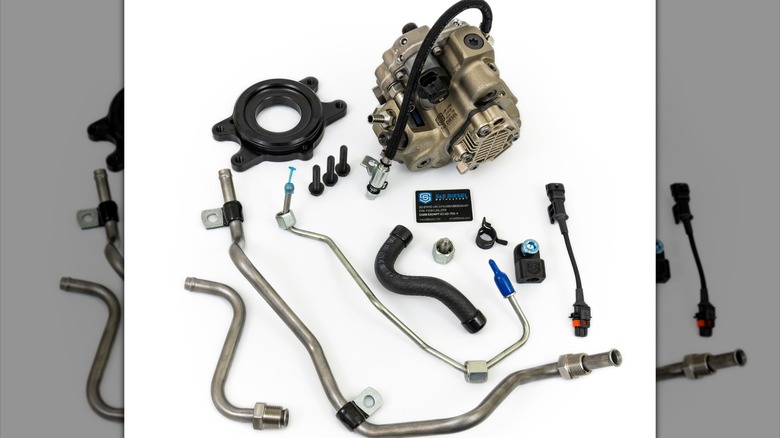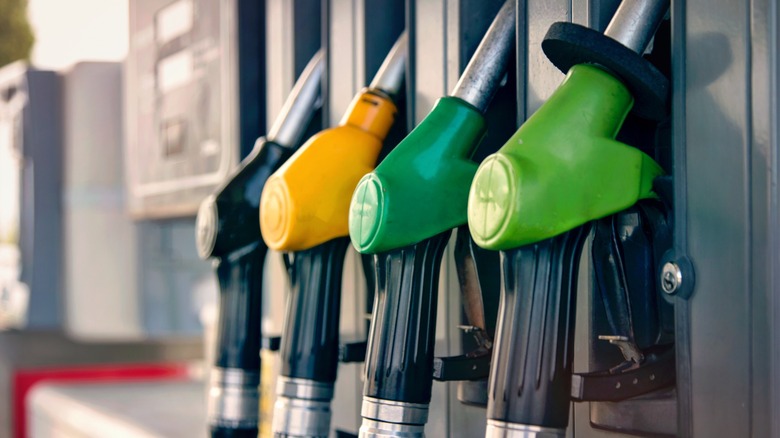CP4 Pump: Which Diesel Engines Use It And Why Is It So Problematic?
Starting in 2011, Ford and General Motors began using Bosch Mobility CP4 pumps to provide high pressure fuel to their diesel engines. GM used the pump on its 6.6-liter LGH and LML Duramax diesel engines through 2016, opting to use the Denso HP4 pump on the L5P Duramax, one of the best Duramax engine versions, starting in 2017. Ram and Jeep used the CP4 pump on vehicles equipped with the 3.0-liter Cummins diesel from 2014 to 2023 with Ram also using it on the 6.7-liter Cummins in its pickup trucks from 2019 to 2020. Nissan got in on the fun, using the oft-maligned CP4 pump from 2016 through 2019 on 5.0-liter V8 Cummins diesel-equipped Titan XD pickups. Ford is the only major automaker to continue using the CP4 injection pump since first installing them on its 6.7-liter Power Stroke diesel engines.
There are technically two versions of the CP4 pump, CP4.1 and CP4.2; however, they're typically referred to collectively as CP4. The difference being the CP4.1 pumps contain a single pumping element compared to the dual-element CP4.2 pumps. As a whole, CP4 pumps are prone to suffer catastrophic failure causing extensive damage to the fuel system at or near the 100,000-mile mark.
What are the problems surrounding CP4 injection pumps?
Having a failed CP4 pump on your diesel engine would be bad enough. To begin with, new or remanufactured CP4 pumps can cost between several hundred dollars to over $1,000, depending on the specific vehicle and the supplier. Unfortunately, the problems don't end there.
As the CP4 pump fails, it can release tiny metal shavings into the fuel system. The metal fragments can infiltrate the high-pressure fuel lines that feed the fuel rails, contaminating the fuel rails themselves, the injectors, overflow valve, and fuel return lines. What's worse, is that the metal fragments can't be removed by simply replacing the pump and flushing out the system components since even one missed particle could start the cycle over again.
Taking your truck to a reputable auto repair shop to fully correct the problem could set you back nearly $10K unless it's covered under warranty (watch for warning signs you're being overcharged). This leads many truck owners to wonder if they're up to the task of tackling the project in DIY fashion.
Is a CP4 injection pump replacement DIY friendly?
While DIY replacement of the CP4 injection pump and associated fuel system components is possible, I wouldn't exactly call it friendly. The most challenging part of working on automobiles I've encountered over 40-plus years is troubleshooting a problem with multiple possible sources. The good news is that you don't necessarily need a car lift, as the bulk of the work occurs under the hood.
Failing CP4 injection pumps often present similar symptoms such as contaminated fuel, clogged fuel filter, bad supply or lift pump, failing injectors, and so on. Specifically, a diesel engine with a bad CP4 pump could misfire, be hard to start, exhibit hesitation upon acceleration, or throw a check engine light (CEL) with codes related to fuel pressure problems. Before you start removing parts to access the CP4 pump, you may want to check if the fuel pump has gone bad or not. While this procedure will likely rely on some specialized tools, they're good to have on hand or they can often be rented or borrowed from stores specializing in tools and auto parts.
Is there any way to prevent CP4 pump failure?
The only way to truly prevent having a CP4 pump failure is to eliminate it. Before automakers started using the problematic CP4 pumps, they used the CP3 version. While it was heavier and perhaps less efficient, it was much more reliable. If your truck is powered by an LML Duramax or 6.7L Cummins, you could replace the CP4 pump by using a CP3 conversion kit from S&S Diesel Motorsport.
While those conversion kits can cost upward of $4,000, 6.7 Power Stroke owners have a cheaper option to prevent catastrophic failure, known as the Disaster Prevention Kit, also from S&S Diesel Motorsport. The Disaster Prevention Kit doesn't include the materials for swapping the CP4 with the older CP3 pump. Instead, it has parts to reroute the fuel return lines through an additional filter, preventing any metal shavings produced by a failing CP4 pump from contaminating the rest of the fuel system.
Preventive maintenance could prolong the life of the CP4 pump
Some preventive diesel engine maintenance could prolong the life of your stock CP4 pump as well. First, you should never run the truck out of fuel, or even low on fuel. One of the main reasons CP4 pumps fail is lack of lubrication. The only lubricant the pumping elements receive is from diesel fuel, so if it runs dry, it's not getting lubrication.
Use the best #2 diesel fuel you can find. Avoid sketchy fuel stops on the outskirts of town when you can. Fuel from big chain stores in high-traffic areas is fresher and has a better chance of being clean.
Using a diesel fuel additive for additional lubrication can help maintain the health of your truck's CP4 pump and is cheap insurance against failure. Adding a bottle of additive with every fill-up is quick and easy.
Keep the diesel fuel clean. Diesel fuel is notorious for becoming contaminated with water. Frequently draining the water separators and changing fuel filters is a must to protect the health of the fuel system and especially the CP4 pump.
